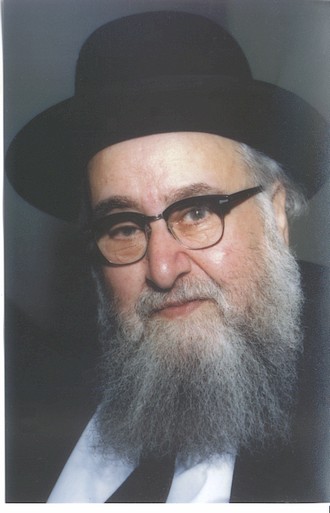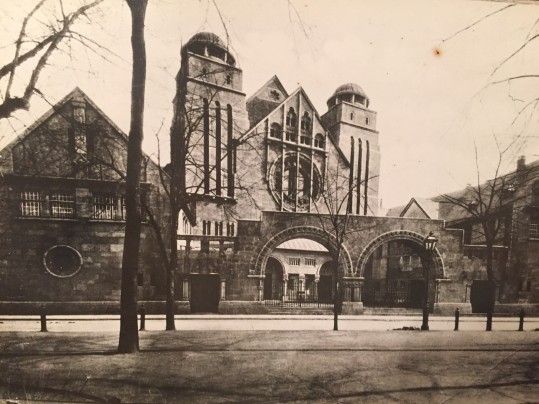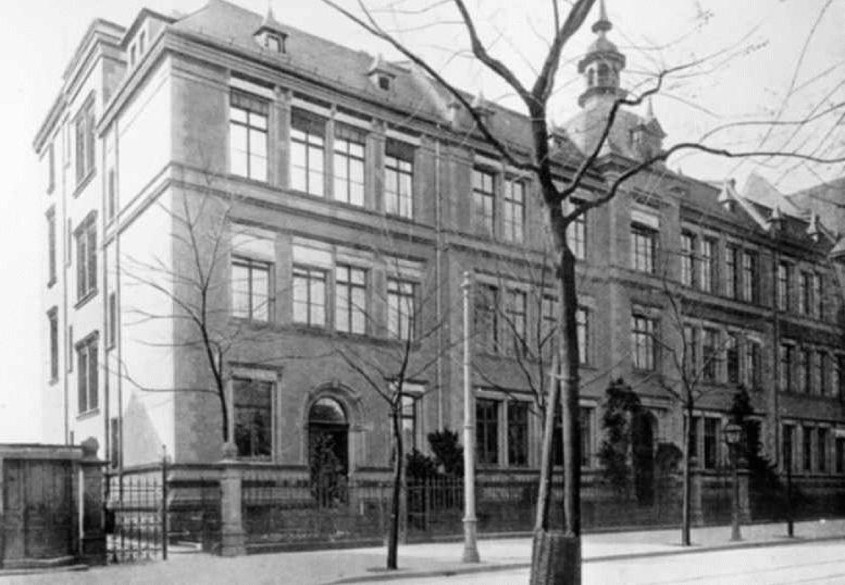| | NEWS
The Life and Life's Work of HaRav Shimon Schwab
by Rav Yosef Fleischman

Editorial note: The article was written and published in 1995/5755 in the months following the petirah of HaRav Shimon Schwab zt"l. This year on Purim Katan will be the 27th yahrtzeit. This is the first of at least six parts.
*
About one month ago, on Purim Katan, 5755, world Jewry in general and American Jewry in particular lost one of its leading rabbonim, Rav Shimon Schwab zt'l. Rav Schwab, in keeping with his life style, didn't allow a hesped to be said at the time.
Although this article is not a hesped it can accomplish one of the purposes of a hesped. We find that Hashem is particularly demanding that an odom godol be given a proper hesped. The gemora says (Shabbos 105B) that one who is lazy in being maspid a chochom is fit to be buried alive. Perhaps that is because this is precisely what has been done to the chochom: he has been buried alive. The gemora says (Brochos 18A) that tzadikim are considered to be alive even after they have died. Thus, the tzaddik, even though he may no longer walk in our midst, is nonetheless very much alive and it is our job to not chas vesholom bury him, but to keep his memory alive by learning from his life and teachings.
Bereishis Rabba (82, 11) says that we do not erect monuments for tzadikim, their words are their memory. That is, their memory is perpetuated in their words. Thus, we would like to help perpetuate the memory of Rav Schwab by understanding his words.
In order to better understand him and what he taught us it will be helpful to intersperse his teachings with details of his biography. In fact, the more we feel the loss of a tzaddik and wish to learn from and to emulate him, the greater we become. The gemora (Chagigah 5B) says even by merely seeing tzadikim in death one receives life, so certainly one who does much more than simply look at him. In fact, Reb Yeruchom (Introduction to Da'as Chochmoh Umussar, Vol. I), the famous Mirrer mashgiach, attributed all his later accomplishments to the sorrow which he expressed on the day following the death of his Rebbe of one year, Reb Simcha Zissel. Thus, let us try to identify with the Rav, learn from his ways and perpetuate his ideals.
Birth and Ancestry
Rav Schwab was born eighty-six years ago on the 7th of Teves 5669 in Frankfurt am Main into an old German family which traces both its name and lineage back for hundreds of years to an area of Germany called Shwaben. Thus the family is known as "Schwab" due to the area of its origin.
Moshe Rabbeinu says in the Shira: Elokei Ovi va'arome'menhu — Hashem is already the G-d of my father and, as Rashi says, the kedusha didn't start with me but already has been there from my forefathers. So it is with Rav Schwab. Although his life was filled with his own accomplishments and achievements in kedusha, the kedusha by no means started with him. Although his paternal and maternal ancestors were baalei batim, they were first and foremost yereim ushleimim who were scrupulously observant of all Hashem's mitzvos. In fact, the mere fact that Rav Schwab was born in Frankfurt was a result of his great-grandfather's having moved there in order to give his children a proper Jewish education.
Rav Schwab's maternal grandfather was the renowned Reb Avrohom Erlanger (grandfather as well of the rosh yeshiva of Yeshivas Kol Torah of the same name). Reb Avrohom came to Wurzberg to learn by the Wurtzberger rav, Rav Seligman Ber Bamberger. In fact, his wife only agreed to marry him on condition that she not be asked to wear a sheitel but rather a long tichel.
After marriage they moved to Lucerne, Switzerland. At first there was no mikveh in Lucerne and his wife had to travel for hours to use a mikveh. The family was childless for a number of years until, upon the advice of his Rebbe, Reb Seligman Ber, Rav Avrohom built a mikveh in his home. Reb Seligman Ber's advice bore fruit — thirteen children followed. Their descendants are so numerous that, in fact, a sefer is being published in Eretz Yisroel that includes the names of thousands of his descendants.
His Parents
Rav Schwab's father, Yehuda (Leopold), likewise was a strictly observant Jew who was well-known even in Frankfurt as an outspoken fighter for Torah umitzvos. In dedicating his commentary on the Chumash to his memory, Rav Schwab describes his father as being ish ho'emess vehachessed veshokeid baTorah.
An example of this occurred when one of his friends transgressed a big aveiroh. He went with a number of his chaveirim to the man's house and sat down with his back facing the man. He proceeded to tell the man, that he is a rosho because of what he did, and he will not look at him until he does teshuva. Not looking at a rosho is based upon the gemora in Megilla 28A. However, it doesn't require one to actually turn his back to him and, in fact, Rabbi Akiva Eiger brings the Magen Avrohom that even looking at a rosho is not forbidden — just staring is prohibited. Nevertheless, one certainly may be more stringent as we find a number of instances in the gemora where Amoraim turned their backs to evince protest and show disagreement cf. e.g. Eruvin 94A.
R' Yehuda Schwab suggested that the avaryan move to America and give himself a fresh start and the group left the man a ticket for the boat ride to the U.S. which the man took and left. (The source for this is probably the gemora in Kiddushin 40A).
His zehirus in mitzvos can also be seen from the fact that, although his mattress business was always struggling, he nonetheless closed his business at chatzos on Friday. (The more stringent opinion in siman 251 is to close at half an hour after chatzos and most poskim hold one may continue until the middle of the tenth hour.) On Chanukah he would close early enough to be home to light at the proper zman. He showed great mesiras nefesh for mitzvos and could not tolerate sheker.
The shul IRG in Frankfurt that HaRav Hirsch founded

Another similarity with his son can be learned from a story R' Avrohom Erlanger told at Rav Schwab's hesped. Rav Erlanger was in England and wanted to travel by boat to Eretz Yisroel. He met Leopold Schwab who asked him how he would be going to Eretz Yisroel: would be take a regular passenger ship or one which is operated by Jews who are mechalel Shabbos. When Reb Avrohom replied that he did not know the details of the boat on which he was to travel, Mr. Schwab became very upset and said that he could not understand how he could not know that he might travel on a boat operated with chilul Shabbos. He was so disturbed by this that later, when Reb Avrohom and Mr. Schwab met again in Gateshead, Mr. Schwab vented his criticism to his son, the mashgiach of Gateshead, Reb Moshe Schwab, and said that he was to blame for having such talmidim who did not know if they will travel to Eretz Yisroel via chilul Shabbos. (The halachic aspects of traveling on Zim Lines are discussed in Igros Moshe, Orach Chaim, I:92, and also in Minchas Yitzchok, 3:39).
Rav Schwab related how an incident at the Seder table one year made a great impression that affected his whole life. One Seder night, the night in which we're commanded to hand down the mesorah to our children, his father took time out to convey a very special message. Rav Schwab relates the incident in Selected Speeches (page 101): "I recall a personal incident of my own childhood which highlights the kind of chinuch I was zoche to receive from my saintly parents, z'l. I must have been eight or nine years old, the oldest of five brothers. At the Seder table, our father asked each of us, `Which of the four sons do you wish to become?' Of course we all answered, `The chochom.' Then my father became deadly serious and he called out with a very loud voice, `If one of my children should ever become a rosho even disregarding one mitzva, I would tell him, "li velo lo — For me and not for him." You have no place any more at my Seder table. Because I love Hashem more than I love you.' Then he resumed the Seder in his normal, gentle manner. This left an indelible impression on all of us. Leave no doubt to your growing children that Hashem is your first priority."
Another very important aspect of Rav Schwab's upbringing is based perhaps on Rav S. R. Hirsch's explanation of Chumash. In Parshas Ki Seitzei (Devorim 21:19) when describing a ben sorer umoreh, the father describes his son as einenu shomei'a bekoleinu — the child does not listen to our voice. On this Rav Hirsch comments that only if both parents speak with the same voice and express the same wishes are they considered blameless for their child's failure. However, if "There is not complete agreement between the parents in bringing up their children, then the failure of the child is no proof of the moral badness of his nature."
Rav Schwab related that this was the education he received. His mother never interfered even when she may have felt her husband was being too strict and demanding from his children. He writes about this in Selected Speeches (page 100) as well. He explains, "When parents disagree (and they do not always have to agree)... that sense of security and trust which is basic, flies out of the window and is gone with the wind." In ruchniyus as well his mother was a role model. She would spend many hours of davening and saying Tehillim with tremendous kavono.
While all of the above certainly exerted positive influence on the Rav and his siblings (two of them mashgichim — HaRav Moshe Schwab of Gateshead and HaRav Mordechai Schwab of Beis Shraga of Monsey — and two of them Torah-true, Torah im derech eretz baalei batim — R' Isaac Schwab and R' Chaim Tzvi Schwab), one must bear in mind that zchus avos doesn't guarantee a successful child and indeed Rav Schwab's life was not based on complacency for what had been accomplished but was a constant struggle to achieve higher levels of kedusha.
The school in Frankfurt that HaRav Schwab attended

Education
Rav Schwab attended the Frankfurt Realschule, the school founded and guided by Rav Hirsch and his successor Rav Shlomo Zalman Breuer zt'l. One of the important lessons that Rav Schwab absorbed was that one should appreciate Hashem's world and see it as a hisgalus Hashem. The Torah is the highest hisgalus of Hashem, but teva is likewise a hisgalus of Hashem. As the gemora says in Eruvin (100b), were it not for the fact that we were given the Torah we would learn tsnius from the cat, not stealing from the ant etc. Rav Hirsch in his Commentary to Tehillim (19:1 — Hashomaim mesaprim kevod Keil...) explains the pesukim there as describing exactly what one can and can not learn from studying nature.
In later years Rav Schwab would take his children to parks, to the zoo and would explain to his children how the various parts of nature are a hisgalus Hashem and would stress how mo rabu ma'asecho Hashem. He would explain how one can see Hashem in every cell found in nature. He felt that the Torah is enhanced and not diminished by building upon other forms of knowledge.
He said if one is mevateil all other knowledge and then says the Torah is greater than all other knowledge then one isn't saying much for the Torah except that it is better than gornicht, but if one says, yes, indeed, nature is beautiful, nature evinces tremendous chochmoh, yet the Torah is greater — then one has indeed stressed the Torah's supremacy. He would compare this to the halocho that chok tochos is not valid, only chok yereichos is kosher. When one writes the Torah, tefillin and the like, one must form the letters by writing the forms of the letters themselves. If one forms letters by cutting away the surrounding material, even if he is thereby left with the letters, it is posul. In the same way, Rav Schwab said that Torah knowledge and outlook is properly built in a positive way on chochmas hateva, and not by negating chochmas hateva.
Another result of Rav Schwab's education in Frankfurt was his intellectual development. Due to the type of program of the Yeshiva, Rav Schwab developed into a thinker already at a youthful age, a trait which served him in good stead at various later stages of his life.
As Rav Schwab advanced in the Yeshiva he was zoche to become a talmid of the rav and rosh hayeshiva HaRav Shlomo Breuer. Rav Schwab learned from him not only the content but also the style of painstaking yegi'as haTorah. He would learn the gemora again and again until he finally felt they had understood the true pshat in a sugya. As Reb Schwab himself relates (Selected Writings, p. 30): "These shiurim were not lectures or classes in the ordinary sense, but rather painstaking excursions into the profundities of the Talmudic world. His students were privileged to participate in the relentless probing of a creative mind searching for the true essence of the dvar Hashem in the discourses of gemora and the commentaries of Rishonim and Acharonim."
Rav Schwab admired Rav Breuer greatly. In fact, Rav Schwab's description of him in the aforementioned article would be an appropriate description of Rav Schwab himself. He writes, "It was his unshakable conviction that any Jewish community which is not subservient to the sole authority of the Law of the Torah must never be recognized as "Jewish" by the followers of the Torah. He was a passionate champion of the truth. He hated the untruth but he despised even more the easy compromise between emes and sheker, the political double talk etc."
At that time, an incident occurred that was to have a profound impact upon Rav Schwab's career. About once a year, Frankfurt would be visited by the late Ponovezher Rov, HaRav Yosef Kahaneman. While staying in Frankfurt the Rav would give a Litvisher Yeshivishe style shiur. One year, Rav Schwab was in the audience. Rav Schwab was so impressed with the level and depth of the shiur that he said, "I want to go where one can hear shiurim of this nature."
He discussed the matter with the Ponovezher Rav who agreed he should go to a Litvishe yeshiva. However, he said that Ponovezh was not the place for a German bochur but suggested Telz as a suitable alternative. He said the lifestyle there in such matters as seder and education conformed more to the German style. Rav Schwab received a letter of introduction from his revered rebbe, Rav Breuer, and it was natural that Rav Breuer's message to Rav Schwab would strike a responsive chord. Rav Breuer told Rav Schwab that he should someday return to Germany since German Jewry needed him. He should not desert to the East as some of Rav Schwab's predecessors had done.
Rav Schwab was particularly attracted to the Telzer Rav, Rav Yosef Leib Bloch. Rav Schwab describes him in the Selected Essays (115),"Reb Yosef Leib Bloch zt'l was the most unique Torah personality imaginable. He was embodiment of regal dignity, an ideal combination of an iron will, a sublime mind and a singing neshomoh living in a higher world of his own." Continuing, Rav Schwab describes, "My relationship with Reb Yosef Leib zt'l was of mixed admiration and fear. Yes, there was fear, eimas hamelech, in contradiction to the relationship I had with my Rebbe, his son, Rav Avrohom Yitzchok Bloch Hashem yikom domo, I adored and loved Rav Avrohom Yitzchok's sweet personality with all the enthusiasm of a seventeen year old yeshiva bochur." Furthermore, Rav Schwab was inspired by the depth of Reb Chaim Telzer's shiurim.
End of Part 1
|




